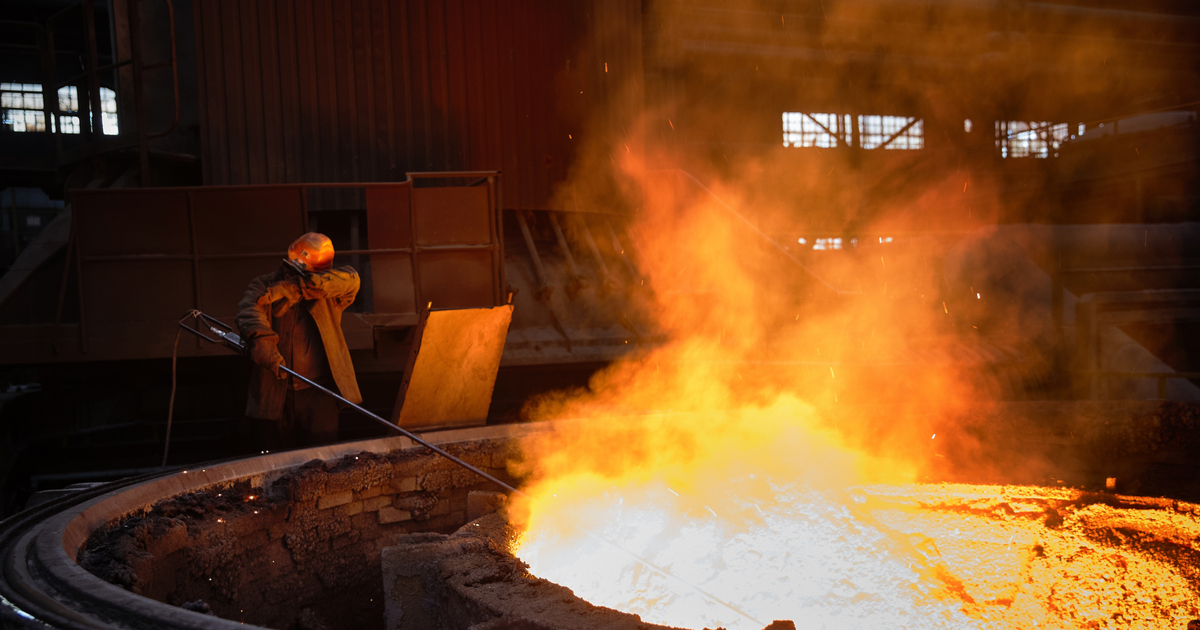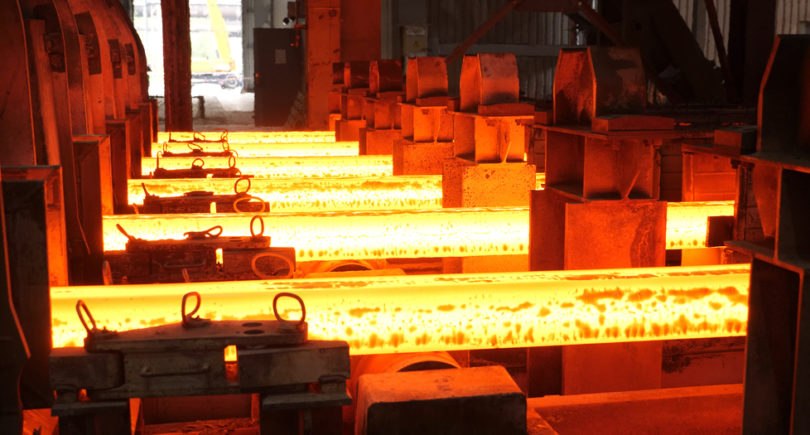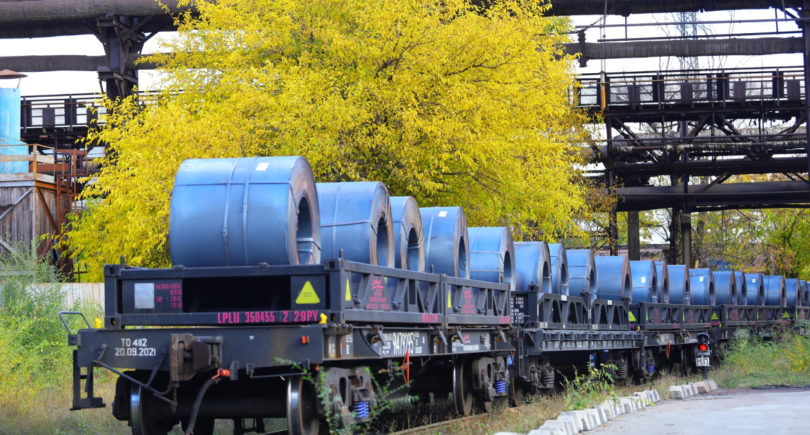
Posts Industry Ukraine’s mining & metals sector 1375 18 July 2022
Business cannot solve many new problems without authorities involvement
The war hit hard on the activities of all enterprises of the mining and metals complex of Ukraine. After the beginning of the war, many large enterprises stopped working, but since April-May, have been resuming operations. Two months later, the margin of many industry companies dried up, so they started massively announce load or capacities reductions due to many new problems that the government is in no hurry to solve together with business.
The end of hopes
According to Ukrmetallurgprom, Ukrainian steel enterprises produced only 300,000 tons of steel in June 2022, which is a quarter less than in May. Steelmakers’ plans for June did not come true, when the production was expected to reach about 500 thousand tons.
The result of the mining industry is no less sad: in June, the export of iron ore shrunk by 23% compared to the previous month – to 1.75 million tons.
Until recently, the average industry level of loading of operating enterprises of the mining and metals complex was 25-28% for steel plants, and 45-50% for mining and processing enterprises. That is, a further reduction in production actually means a stoppage of capacities.
Falling prices and rising costs
One of the biggest problems of the industry was the global market deterioration. Rising prices driven by disruptions in supply chains allowed domestic exporters to offset some of the losses associated with increased spending due to the war. However, by mid-July, prices for rolled products and raw materials were already below pre-war levels.
“Currently, there is a rapid decline in prices for metal and raw materials, which requires companies in our industry to pay maximum attention to cost management. Of course, we need government support in resolving the issue of logistics in order to increase production and reach full capacity. Careless and non-considered steps in the field of finance and logistics can provoke additional risks for the industry, lead to critical consequences throughout the country,” adds Yaroslavna Blonska, executive director of marketing in Europe and external relations of Ferrexpo.
Ferrexpo, which produces pellets with a high iron content, decreased its output in the 2nd quarter by 27% compared to the same period last year.
The problem of rising production costs has also gone urgent. There are many factors, including high energy prices, need to import more expensive coal, logistics costs growth, and high inflation in Ukraine, denominated in dollars.
“The question of the survival of our enterprise has never been so urgent. We are forced to cut our spending across the board.” said Mauro Longobardo, ArcelorMittal Kryvyi Rih CEO.
ArcelorMittal had previously considered restart of another blast furnace, but was forced to abandon those plans. From the beginning of July the company switched a significant part of the employees to 2/3 of the load due to the inability to pay full salaries.
The bottleneck
The industry is experiencing huge problems in logistics. Earlier, statements on the priority of grain exports were repeatedly heard in Ukraine at all levels. This resulted in bans on the shipping of iron and manganese ore to Czech Republic and Poland. Also, at the beginning of July, freight cars lines in the direction of border crossings exceeded 35 thousand units. At a number of border crossings, a car stand in line for 50-80 days. This situation leads to a violation of delivery times and an increase in costs for the sender.
From the very beginning of the war, Kametstal did not reduce its load and worked for export, providing 100% of pre-war volumes. This is a unique case. However, logistical problems forced the company to stop one of the three blast furnaces in May, and the second in early July.
“The biggest problem in steel industry is still logistics. The products that we produced as early as February 24, despite the situation in the country, are piling. Its volumes are transported across borders to consumers very difficultly. And this piling is already so critical that last week we were forced to stop one of our key units, the blast furnace,” explained CEO of Kametstal Dmytro Lippa.
Zaporizhstal Iron and Steel Works, after stopping at the start of the war, was able to restart two blast furnaces in April and planned to start another one by August. However, today the steel plant is considering production cut option due to significant problems with logistics and the inability to ship products to consumers in Europe.
“Problems with logistics have not been solved. We have significant problems with the shipment of our products to customers in the EU. All our routes before the war passed through ports, but so far, they are inaccessible. Now we have a significant overstocking at the border crossings in western Ukraine. All this forces us to consider the option of reducing production, because our products simply cannot be shipped across the border,” explained Olexander Myronenko, CEO of Zaporizhstal.
Regulatory policy
Mining companies have suffered from short-sighted regulatory policies. For example, the rent for mining iron ore has risen twice in the last two years. Business stands for wartime rent reduction. The reduction in production at mining and processing plants will lead to the losses of local budgets. Earlier, ArcelorMittal paid a UAH 2.2 billion tax on mining in advance.
The already extremely difficult situation was aggravated by the initiative of Ukrzaliznytsya to increase tariffs for freight shipment by 70%. Even if the situation on the markets improves, the problem with logistics is resolved, the new tariffs will not allow to count on a quick recovery in production volumes in the mining & metals industry.
“According to the calculations of our specialists, logistics has risen in price by about 400%. The growth of transportation costs for shipment through the territory of Ukraine for the products of ArcelorMittal Kryviy Rih will be more than 45%, which could lead to a complete halt in the export of steel products to European markets from August 2022. In fact, this will force us to stop exporting products and completely stop steel production,” emphasized Head of ArcelorMittal Representative Office in Kyiv Volodymyr Tkachenko.
Problems with budget revenues in a country at war, which has lost from 35% to 50% of the economy, are obvious. Their decision is connected with additional pressure on business. For example, many companies failed to register VAT invoices. For example, ArcelorMittal’s a delayed refund amount was UAH 3.8 billion. The pressure on business only exacerbates the situation and also leads to a reduction in output.
General conclusions
Mining & metals enterprises stop or reduce their production volumes due to a bunch of problems. And it is important the state not to worsen the situation. For example, in the case of an unexpected and unreasonable increase in railway tariffs for all cargoes by 70% at once. Therefore, business is waiting for the authorities to help solve existing problems and at least not create new ones.
There are some positive developments in logistic issue. For example, Ukrzaliznytsya is implementing monthly load plans for export shipments and related algorithms that are designed to reduce cars lines.
Extremely important events are now in Turkey, where a round of negotiations between Ukraine, Russia, Turkey and the UN over the export of grain through Ukrainian ports has ended. This is important not only for food security. This will also reduce the load on railway border crossings and improve the logistics of other cargo, including the cargo of steelmakers.
Steelmakers also urge to pay attention to tax issues, in particular, rent and timely VAT refunds.





